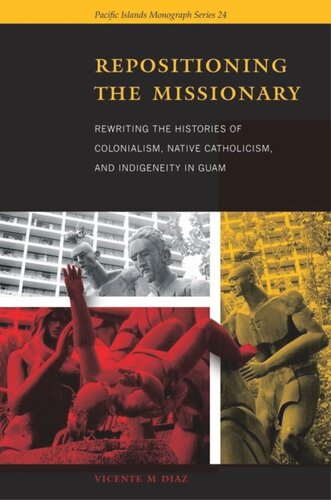

Most ebook files are in PDF format, so you can easily read them using various software such as Foxit Reader or directly on the Google Chrome browser.
Some ebook files are released by publishers in other formats such as .awz, .mobi, .epub, .fb2, etc. You may need to install specific software to read these formats on mobile/PC, such as Calibre.
Please read the tutorial at this link: https://ebookbell.com/faq
We offer FREE conversion to the popular formats you request; however, this may take some time. Therefore, right after payment, please email us, and we will try to provide the service as quickly as possible.
For some exceptional file formats or broken links (if any), please refrain from opening any disputes. Instead, email us first, and we will try to assist within a maximum of 6 hours.
EbookBell Team

4.8
24 reviewsIn the vein of an emergent Native Pacific brand of cultural studies, Repositioning the Missionary critically examines the cultural and political stakes of the historic and present-day movement to canonize Blessed Diego Luis de San Vitores (1627–1672), the Spanish Jesuit missionary who was martyred by Mata'pang of Guam while establishing the Catholic mission among the Chamorros in the Mariana Islands. The work juxtaposes official, popular, and critical perspectives of the movement to complicate prevailing ideas about colonialism, historiography, and indigenous culture and identity in the Pacific.
The book is divided into three sections. The first, "From Above, Working the Native," focuses exclusively on the narratological reconsolidation of official Roman Catholic Church viewpoints as staked in the historic (seventeenth century) and contemporary (twentieth century) movements to canonize San Vitores, including the symbolic costs of these viewpoints for Native Chamorro cultural and political possibilities not in line with Church views. Section two, "From Below: Working the Saint," shifts attention and perspective to local, competing forms of Chamorro piety. In their effort to canonize San Vitores, Natives also rework the saint to negotiate new cultural and social canons for themselves and in ways that produce new meanings for their island. "From Behind: Transgressive Histories" shifts from official and lay Roman and Chamorro Catholic viewpoints to the author’s own critical project of rendering alternative portrayals of San Vitores and Mata'pang.
Theoretically innovative and provocative, humorous, and inspired, Repositioning the Missionary melds poststructuralist, feminist, Native studies, and cultural studies analytic and political frameworks with an intensely personal voice to model a new critical interdisciplinary approach to the study of indigenous culture and history.